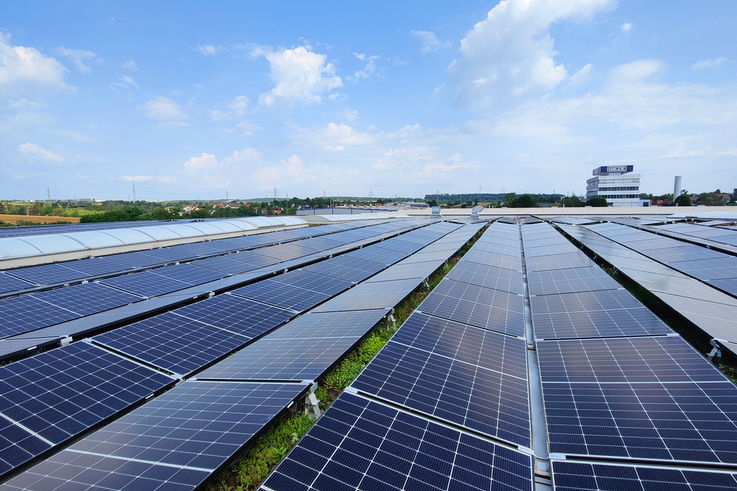Expanded independence: GEZE invests in new photovoltaic system
GEZE products aren’t the only way the company contributes to building sustainability. The company has utilised large areas available to it at the Leonberg site and installed a photovoltaic system on several roofs. By doing so, the company is expanding its independence in the energy sector and continuing to focus on sustainability. After the first few months in operation, there is already a recognisable increase in the proportion of renewable energies in the company's total global consumption.
Making good use of large areas

Sustainable land utilisation: GEZE has installed photovoltaic systems on several roofs at its main site in Leonberg. © GEZE GmbH
GEZE has long been committed to sustainable and responsible behaviour. This focus is based on the United Nations' 17 Sustainable Development Goals (SDGs) for socially, ecologically and economically sustainable development. At the Leonberg site, GEZE has been using only certified green electricity for several years in order to reduce its own CO2 footprint and has already been able to save more than 4,000 tonnes of CO2 equivalents per year. As the next step on the road to the energy transition, GEZE began installing a photovoltaic system on the roofs of the production and warehouse buildings in Leonberg in December 2023. These large roof areas are ideal for generating sustainable electricity from solar energy. By doing so, GEZE is increasing its independence from volatile electricity prices and high grid charges, while at the same time increasing the proportion of renewable energy throughout the company.
Initial balance sheet shows good results

With the new photovoltaic system, GEZE is increasing the proportion of renewable energy throughout the company. © Juergen Pollak, Neue Weinsteige
The first part of the system, with 475 kWp, was commissioned at the end of April 2024, followed by the second with 365 kWp in mid-May. With 1977 modules, the system thus achieves a total output of 840 kWp. An initial balance sheet shows: 230 MWh has already been generated during the sunny months between May and September 2024. On a good day, the system generates around 4500 kWh, which is roughly equivalent to the annual electricity consumption of a detached house with four residents. The electricity is almost entirely consumed by GEZE itself. Surplus energy, some of which is generated at weekends, is fed into the public grid.
Further expansion of self-sufficiency planned
Most recently, the level of energy self-sufficiency at the headquarters in Leonberg averaged 20 per cent thanks to the new photovoltaic system, with this figure even reaching 24 per cent in July. Simulations estimate an annual average of 12 per cent. In view of these figures, it can also be assumed that GEZE will significantly increase the share of renewable electricity in total global consumption in the current year. This share most recently stood at around 52 per cent in the 2022/2023 financial year. Additional increases are expected in the future, as further roof refurbishments with photovoltaic systems are already being planned.
In order to raise energy awareness and keep an eye on energy consumption, an energy monitoring system was introduced which, in addition to analysing energy consumption, also enables the implementation of targeted measures to increase energy efficiency. Among other things, GEZE operates a combined heat and power plant at its main site in Leonberg, which supplies the buildings with heat.
GEZE products increase sustainability in buildings
The family business from Leonberg will therefore continue to focus on the expansion of sustainable production in the future and continues to develop in this area. In addition to this resource-conserving overall focus of the company, GEZE also contributes to a sustainable way of life with its products. The specialist for innovative and modern door, window and safety technology offers intelligent solutions that enable sustainable building. By effectively integrating automatic doors and windows into the building automation system, great energy-saving potential can be realised both in new buildings and in the modernisation of existing buildings. Intelligent ventilation control enables a night-time cooling of buildings, for example. In addition, the longevity of products, which is made possible by high product quality, is a key factor in promoting sustainability. This conserves resources and produces less waste.
More about sustainability at GEZEPress information
For editorial questions:
Jonathan Wurster
thepublic GmbH
Tel.:+49-151-14648048
E-Mail: geze@thepublicpr.com